- Home
- Farley Mowat
The Black Joke Page 3
The Black Joke Read online
Page 3
At that time he had some thought of attempting to buy Black Joke from Jonathan Spence, even though he knew in his heart that Jonathan almost certainly would not sell her. But after the encounter with the bilge pump he gave up any ideas he might have had of trying to acquire her by fair means.
Bathed, and changed into clean clothes, he sat at his desk once more, slowly writing a reply to his friend in St. Pierre.
3
The Dark Clouds Lighten
THE WEATHER remained fine throughout the following week, and work aboard Black Joke went forward rapidly. The upperworks soon glistened with fresh paint. The deck was tight again. The running rigging had been rove off and the vessel had begun to look eager and seagoing once more.
But now that the job was done, Jonathan again lapsed into a mood of dark depression. He was ready to work. The ship was ready. And there was no work for either of them. If nothing turned up in the next week or two, he knew he would be forced to go to Simon Barnes and ask for credit at the store; for his wife, Sylvia, had almost exhausted the supply of staple foods which Jonathan had brought in from St. John’s the previous autumn. There was still lots of fish, both fresh and salt, but nobody can survive on fish alone, least of all the seven children who now lived in Jonathan’s house. These included his own two girls and two boys, of whom Peter was the oldest, together with the three orphaned children of his brother Kent, led by Kye.
It was a quiet Saturday afternoon. Kye and Peter with some of the younger boys went up the harbor in a dory to try their luck fishing for sea trout. Sylvia, helped by her two young daughters, was finishing the dishwashing. Jonathan was sitting on the front steps, his eyes on Black Joke while he once again went carefully over all the possibilities for the employment of himself and his ship. He could think of nothing new. The only hope, and it was so faint as to be hardly worth considering, was that one or another of the St. John’s fish dealers might have changed his mind about chartering Black Joke for a trip to Jamaica. Jonathan had laboriously written to these dealers again, begging them for work. An answer might be arriving on the weekly coast boat which was due that evening; and on this answer Jonathan pinned his final hopes.
Just before dusk the silent harbor came suddenly awake as a sonorous steam whistle sounded from beyond the entrance. The sound echoed and re-echoed from the surrounding cliffs. Doors burst open throughout the settlement as people began to pour out into the warm spring air. The children came first, racing wildly down the steep paths toward Barnes’s wharf where the steamer would berth. Their elders followed more sedately, but by the time the little S. S. Fortune had poked her old-fashioned prow into the harbor proper, almost the entire population of Ship Hole was waiting for her on the dock. “Steamer time” was the great event of the week.
The mail was unloaded first and carried to the Simon Barnes store, for Simon was, amongst his many other roles, the postmaster.
Jonathan Spence was already waiting by the post office wicket.
“Letter for ye, Skipper,” said Simon’s clerk. “Come from St. John’s, I do believe.” He passed it across the counter.
Barnes, who had been standing nearby, quietly shifted his position so that he could watch as Jonathan moved away from the crowd, tore open the letter and studied its contents. Having had no formal education, Jonathan could not read easily, but he had no difficulty gathering the import of this reply to his pleading letter to the St. John’s merchants. As he thrust the envelope into his pocket and turned toward the door, his face mirrored the bitter disappointment he felt.
“A moment, Skipper Spence,” Barnes called after the departing Jonathan. “Can ye spare a moment, Skipper?”
Jonathan hesitated; he was in no mood to talk to anyone, but there was still politeness to consider. Reluctantly he turned about.
Barnes was too astute to refer directly to the letter, whose contents he had already guessed. Assuming his most amiable and friendly attitude he invited Jonathan into his private office.
When Jonathan emerged half an hour later he walked with the spring of a young man. His face was alight with eagerness and he almost ran up the long slope to his own home where Sylvia and the elder children were sitting by lamplight. The children were doing their lessons under Sylvia’s direction, for there was no school in Ship Hole.
Throwing open the door and striding into the big kitchen, Jonathan caught Peter and Kye such a whack on their shoulders that they very nearly collapsed over their spellers.
“Enough o’ that bookwork,” he cried. “They’s man’s work to be done, me sons! Three days hence Black Joke goes to sea, and I’ll be needin’ willin’ hands.”
Pandemonium broke loose and it was some time before things quieted down enough for Jonathan to explain.
“’Tis this way, ye see,” he began. “Ye know Barnes has collared the timber trade ’twixt Bay Despair and St. Peter’s Isle. Well now, it seems he’s got a rush order for timber for the Frenchies, and his own schooners won’t be fit to sail for a couple of weeks or more. He’s stuck, ye see. Stuck good. Anyhow, he’s chartered Black Joke to make the trip. And somethin’ more. The old dogfish agreed to give us three more charter trips if I’d help him out of a hole by taking on this one. He balked over that, but I told him straight I’d not shift a line until he gave his word, and wrote it out on paper too! And here it is.”
He thrust a slip of paper under the lamplight and the family crowded around to spell out the words of the agreement written in the merchant’s angular handwriting. Unable to contain himself, Peter grabbed the paper and began dancing around the big kitchen table.
“Ye’re takin’ Kye and me, Father,” he cried. “Ye said ye were. I heard ye good!”
“Hush now,” his father answered. “Ye’ll have the whole settlement out to see what the row’s about.” He turned to his wife and, almost apologetically, continued:
“I know ye’ll not like it, Sylvia. But ye see, I’ve no money for to hire a crew, and if I take a couple of men on shares, there’ll be precious little left for ourselves at the end of the voyage. It’s an aisy voyage. Inside-waters, the most of it, and a bare thirty mile of open crossin’ to St. Peter’s. I’ll watch the weather sharp, and never sail unless it’s fine. The b’ys are nigh onto bein’ men, ye know. The three of us can work the ship. We has to do it–they’s no other way.”
Kye and Peter were closely watching Sylvia’s face. The chance to make a voyage with Jonathan, not as deck boys or passengers, but as real crew, was almost too good to be believed. They hung anxiously over the table waiting for Sylvia’s reply.
She smiled.
“There’s no place to argue,” she said gently. “The work must be done, and when there’s not men enough, then b’ys must give a hand. Take a care, Jonathan; though I know ye will.”
The Spence family was a long time going to bed that night. In celebration of their luck Sylvia made a huge lunch for them all, with pots of tea, and brown, crisp blueberry tarts. There was no longer any need to skimp.
Simon Barnes was also enjoying a celebration, though a much quieter one. Until nearly midnight he sat in his office, a bottle of contraband rum at his elbow, contemplating with increasing pleasure the ease with which he had persuaded Jonathan Spence to stick his neck into a noose.
A few minutes before midnight there was a gentle knock on his door. Barnes turned down the flame of the oil lamp before he opened to the visitor. It was Millar. Barnes gave him a letter-packet.
“Out with you now,” he said. “The Frenchy’ll be in to pick this up at the lobster pots soon as the moon is down. If you miss him, I’ll have yer eyes for it!”
Black Joke duly sailed the following Tuesday morning. Her departure was a gala event. Every boy and most of the men in the settlement were on the beach to watch her go. The boys stared enviously at Peter and Kye as they nipped about the decks in answer to Jonathan’s orders.
There was no breeze in the harbor so they departed under power. Kye had been given charge of the engine and on h
is first try he managed to spin the huge flywheel by himself and get the bullgine started. As it belched blue smoke from its exhaust, Jonathan gave his orders in a ringing voice.
“Let go aft–run her up to half speed, Kye!”
Kye, who had been standing with his head out the engine-room companionway waiting for the order, ducked below and shoved the throttle forward. The old engine thumped and jumped on its bed. The propeller churned, and slowly Black Joke drew away from the wharf and pointed her shapely bow toward the harbor entrance. On the steps of the Spence house Sylvia lifted a big conch horn to her lips and blew a blast of farewell that was answered by Peter, pumping the handle of the ship’s foghorn.
The departure would have been perfect; except for one thing. Black Joke was carrying a passenger, and one of whom her crew did not approve. On Monday night Simon Barnes had sent a message to Jonathan announcing that he intended to accompany them on the voyage to supervise the loading and delivery of the cargo. It was a most distasteful prospect, but there was nothing Jonathan could do about it since his ship was under charter to the merchant.
Unfortunately for Barnes, he was no sailor. Even before the ship had cleared the quiet waters of the harbor and had begun to lift to the eternal swell of the open Atlantic, he disappeared from view to stretch himself out on one of the bunks in the forepeak.
“Fat ole landlubber!” Peter muttered to Kye as the two boys ran forward at Jonathan’s command to begin hauling up the headsails. “Hope we git a hurricane. Might make him sick enough to die.”
“Be no loss, I guess,” Kye replied.
“Sway her up, b’ys,” Jonathan barked from the wheel.
Slipping the halyard coil from the pinrack at the base of the mast, the two lads began hoisting the jib. It rattled and banged in the grip of a fresh southwesterly breeze that was beginning to blow, but they soon had it swayed-up and made fast, and the sheet hauled in so that the sail began to draw. The jumbo followed, then Kye went aft to take the wheel while Jonathan, helped by Peter, hauled up the big mainsail and the smaller foresail.
It was tough work for so small a crew, but all three were used to hard work and, though they were slower than a proper crew would have been, they managed the job in shipshape fashion. A few minutes after clearing the harbor entrance the engine was stopped and Black Joke was soon lying easily over on the starboard tack with all sails filled and drawing. The quartering breeze sent her boiling along at a good eight knots with a white bone at her teeth while to the north the great red coastal cliffs began to slide past.
It was a four-hour passage to the mouth of Bay Despair, but on such a bright spring day as this the boys could have wished it was forty hours. They stood alternate half-hour tricks at the wheel, for it was imperative that they should practice their helmsmanship. Steering a big schooner under all sail is not the easiest thing in the world. It is always necessary to keep a weather eye on the wind and the sails, watching for a shift, while at the same time trying to keep the vessel on a steady course.
Peter had been at the wheel about ten minutes when Jonathan came aft. He stood silent a moment, looking back at the ship’s wake.
“’Tis a funny thing, Peter,” he said after a time. “There be no snakes at all in Newfoundland unless it happen there’s one steerin’ this here ship.”
Surprised, Peter cast a quick glance astern. To his horror he saw that the ship’s wake, instead of being an arrow-straight line, was more like a continuous letter S. He began spinning the big wheel to straighten out the wake, but the more he spun it, the more the ship swung alternately from one side to the other of her proper course.
“Steady, lad,” said Jonathan, amused at his efforts. “Be aisy with her. Just keep her sails full and by, and cock your eye on them islands up ahead to give ye a course.”
Relaxing, Peter did as he was told and after a few more minutes the feel of the ship began to seep into him. He began to find himself so exhilarated by her motion, and by the knowledge that the whole eighty tons of her was as responsive as a child to his command, that he was soon steering instinctively; and the wake had straightened up behind him.
Meanwhile Kye had gone down to the forepeak to stir up some grub for dinner. He found Barnes still stretched out on a bunk. Tentatively Kye (who was secretly afraid of the merchant, as were all the boys of Ship Hole) cleared his throat and politely asked:
“Would ye feel like a bowl of fish and brewis, sorr? Missis Spence, she sent a pot of it on board for we ’uns.”
Fish and brewis, which is a pudding-like mixture of softened ship’s biscuits, salt cod and pork fat, is not the best thing to offer a man whose stomach is heaving with seasickness. But Kye did not know that, and he was shocked and enraged when the merchant answered with a particularly lurid curse.
Kye held back the angry comment he wanted to make, and, turning to the old stove, he soon had a roaring wood fire going. Then, deliberately and with malice aforethought, he took a frying pan and, half-filling it with thick slices of fat pork, set it to sizzling merrily on the stove. As if this were not enough, he soon contrived to spill some of the grease onto the stove lid where it sent up a billowing oily smoke which filled the whole forepeak.
There was a stifled groan from Barnes. Suddenly the merchant rolled off the bunk, staggered to his feet and made a rush up the companion ladder for the deck. Kye watched him go, with a wicked grin on his face.
“Maybe that’ll teach ye to be more polite, ye old goat,” he muttered to himself. Whistling happily he stowed the pan of pork fat in a locker and began warming up the pot of brewis and boiling the tea kettle.
By two o’clock that afternoon Black Joke had come abeam the mouth of Bay Despair. Now Jonathan took the wheel and brought the ship around on the other tack so that her course lay northward between Whale Rock and the mainland. This was not the main entrance but a shortcut or “inside” passage, full of sunkers (as reefs and shoal rocks are called in Newfoundland). It was the kind of place ships would normally stay well away from unless their pilots knew the waters well. However, Jonathan knew the passage perfectly, and he was anxious to get well into the Bay before nightfall so he had chosen the inside route in order to save time.
The passage through the sunkers was wildly exhilarating to the two boys. The ocean surge, bursting on the myriad reefs, sent great towers of spray billowing up on either side of Black Joke, and so close to her that wind-driven foam fell all across her decks. Boiling along with all sheets started, she was sailing so fast that an inexperienced observer would have been certain she was going to smash headlong into one of the unseen sunkers whose presence was revealed only by the swirling waters over them.
Barnes was not inexperienced, but on previous voyages, usually in his own schooners, his captains had carefully chosen the less spectacular passages. Despite his heaving stomach he was still able to take notice, and he was horrified at what he saw.
“Damn you, Spence!” he cried from his position hanging half over the lee rail. “Are you trying to drown us and sink the vessel? Get her out of this, you hear!”
Now, once at sea, the master of a ship is simply that–the master. Only a very foolhardy passenger, even if he has chartered the vessel, would dare criticize the master’s judgment. The arrogance of this merchant in attempting to give him sailing orders was enough to fire Jonathan’s temper to white heat. He managed to control himself, and he made no reply; but as far as he was concerned the brief truce between himself and the merchant–which had resulted from the charter–was at an end.
Clearing the inside passage, Black Joke ran down the main opening of the Bay past the little outport of Push-through and into the Lampidose Passage, whose towering cliff walls lead to the head of the bay and to the twin villages of Milltown and St. Albans. The wind held steady and an hour before dusk Black Joke was abeam of Milltown.
When the lines were fast to the wharf, and the ship settled for the night, Jonathan joined the two boys in the forepeak. Barnes had gone ashore.
It was Peter’s turn to act as cook and he was just dishing up supper when his father climbed down the ladder and took his place at the table.
Jonathan looked at the two boys for a moment.
“For a pair of tom-cods with no brains and not much brawn, ye do all right,” he said, smiling. “Give me a month or two, and I’ll make sailors out of ye…or else.”
Kye and Peter caught each other’s glance. Neither would have admitted it, but they were as pleased as only two boys can be who have been told they can do a man’s job and do it well.
4
Encounter with a Salmon
TUCKED snugly in their bunks, with the water lapping against the vessel’s planks to quiet them after the day’s excitement, the boys slept right through the early morning sounds of the lumbering town as it awakened. They did not hear the steam whistle at the ramshackle lumber mill screech its summons to the dozen or so men who operated the old-fashioned plant. They did not hear the high whine of the saw as it bit into its first log of the day. They were too dead to the world to hear anything–but they could still smell.
The sharp odor of boiling coffee seeped into Peter’s sleeping thoughts. His nostrils wrinkled like those of a dog smelling a bone, then his eyes popped open and he was wide awake in an instant. Raising one foot he put it against the woven rope spring of the bunk above him and pushed hard.
“Hey, Kye! Quit poundin’ your ear!” he shouted. “You goin’ to sleep all day?”
Standing beside the stove, Jonathan watched the by-play with a smile. While the two boys tumbled out of their bunks and began to pull on their clothes, he dished up three huge bowls of cornmeal porridge and slapped them down on the cabin table.

 Owls in the Family
Owls in the Family A Whale for the Killing
A Whale for the Killing Sea of Slaughter
Sea of Slaughter The Curse of the Viking Grave
The Curse of the Viking Grave The Boat Who Wouldn't Float
The Boat Who Wouldn't Float The Farfarers: Before the Norse
The Farfarers: Before the Norse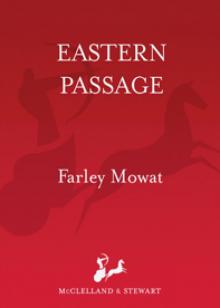 Memoir
Memoir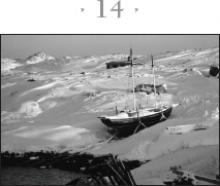 Bay of Spirits: A Love Story
Bay of Spirits: A Love Story The Black Joke
The Black Joke Sibir: My Discovery of Siberia
Sibir: My Discovery of Siberia The Dog Who Wouldn't Be
The Dog Who Wouldn't Be Never Cry Wolf
Never Cry Wolf And No Birds Sang
And No Birds Sang The Snow Walker
The Snow Walker Born Naked: The Early Adventures of the Author of Never Cry Wolf
Born Naked: The Early Adventures of the Author of Never Cry Wolf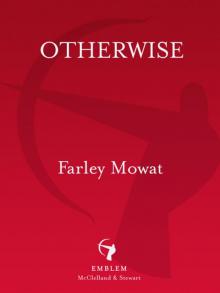 Otherwise
Otherwise Lost in the Barrens
Lost in the Barrens Gorillas in the Mist
Gorillas in the Mist People of the Deer
People of the Deer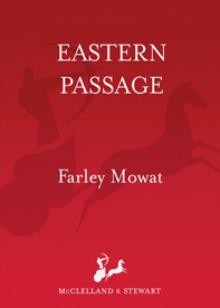 Eastern Passage
Eastern Passage Sibir
Sibir The Farfarers
The Farfarers A Whale For The Killing (v5.0)
A Whale For The Killing (v5.0)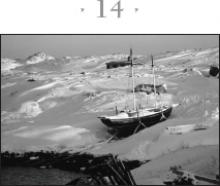 Bay of Spirits
Bay of Spirits And No Birds Sang (v5.0)
And No Birds Sang (v5.0) Born Naked
Born Naked